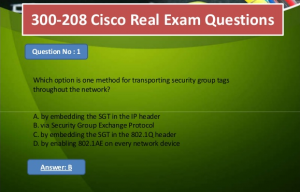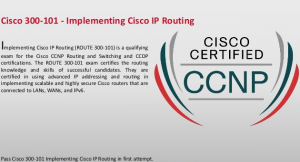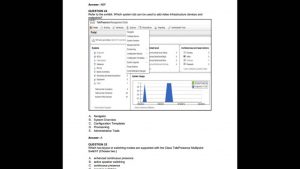Update free latest Cisco CCNA 200-125 dumps exam questions and answers at leads4pass. leads4pass offers best Cisco CCNA 200-125 dumps pdf training materials and study guides. https://www.leads4pass.com/200-125.html dumps pdf practice files. High quality Cisco CCNA 200-125 dumps pdf and vce practice files free download, pass Cisco 200-125 exam test easily at first try.
Download Free Latest Cisco 200-125 Dumps PDF From Google Drive: https://drive.google.com/open?id=0B_7qiYkH83VRSnZDMkVUWDJzLWM
Download Free Latest Cisco 210-260 Dumps PDF From Google Drive: https://drive.google.com/open?id=0B_7qiYkH83VRcnI0SE83bHBvQ1k
QUESTION 1
A network interface port has collision detection and carrier sensing enabled on a shared twisted pair network. From this statement, what is known about the network interface port?
A. This is a 10 Mb/s switch port.
B. This is a 100 Mb/s switch port.
C. This is an Ethernet port operating at half duplex.
D. This is an Ethernet port operating at full duplex.
E. This is a port on a network interface card in a PC.
Answer: C
QUESTION 2
A network administrator is verifying the configuration of a newly installed host by establishing an FTP connection to a remote server. 200-125 pdf What is the highest layer of the protocol stack that the network administrator is using for this operation?
A. application
B. presentation
C. session
D. transport
E. internet
F. data link
Answer: A
QUESTION 3
A switch is configured with all ports assigned to vlan 2 with full duplex FastEthernet to segment existing departmental traffic. 200-125 dumps What is the effect of adding switch ports to a new VLAN on the switch?
A. More collision domains will be created.
B. IP address utilization will be more efficient.
C. More bandwidth will be required than was needed previously.
D. An additional broadcast domain will be created.
Answer: D

QUESTION 4
Which of the following describes the roles of devices in a WAN? (Choose three.)
A. A CSU/DSU terminates a digital local loop.
B. A modem terminates a digital local loop.
C. A CSU/DSU terminates an analog local loop.
D. A modem terminates an analog local loop.
E. A router is commonly considered a DTE device.
F. A router is commonly considered a DCE device.
Answer: ADE
QUESTION 5
Refer to the exhibit. Which three statements correctly describe Network Device A? (Choose three.)
A. With a network wide mask of 255.255.255.128, each interface does not require an IP address.
B. With a network wide mask of 255.255.255.128, each interface does require an IP address on a unique IP subnet.
C. With a network wide mask of 255.255.255.0, must be a Layer 2 device for the PCs to communicate with each other.
D. With a network wide mask of 255.255.255.0, must be a Layer 3 device for the PCs to communicate with each other.
E. With a network wide mask of 255.255.254.0, each interface does not require an IP address.
Answer: BDE
QUESTION 6
Refer to the exhibit. What will Router1 do when it receives the data frame shown? 200-125 dumps (Choose three.)
A. Router1 will strip off the source MAC address and replace it with the MAC address 0000.0c36.6965.
B. Router1 will strip off the source IP address and replace it with the IP address 192.168.40.1.
C. Router1 will strip off the destination MAC address and replace it with the MAC address 0000.0c07.4320.
D. Router1 will strip off the destination IP address and replace it with the IP address of 192.168.40.1.
E. Router1 will forward the data packet out interface FastEthernet0/1.
F. Router1 will forward the data packet out interface FastEthernet0/2.
Answer: ACF
QUESTION 7
Which layer in the OSI reference model is responsible for determining the availability of the receiving program and checking to see if enough resources exist for that communication?
A. transport
B. network
C. presentation
D. session
E. application
Answer: E
QUESTION 8
What is the function of the command switchport trunk native vlan 999 on a Cisco Catalyst switch?
A. It creates a VLAN 999 interface.
B. It designates VLAN 999 for untagged traffic.
C. It blocks VLAN 999 traffic from passing on the trunk.
D. It designates VLAN 999 as the default for all unknown tagged traffic.
Answer: B
QUESTION 9
Refer to the exhibit. Switch-1 needs to send data to a host with a MAC address of 00b0.d056.efa4. What will Switch-1 do with this data?
A. Switch-1 will drop the data because it does not have an entry for that MAC address.
B. Switch-1 will flood the data out all of its ports except the port from which the data originated.
C. Switch-1 will send an ARP request out all its ports except the port from which the data originated.
D. Switch-1 will forward the data to its default gateway.
Answer: B
QUESTION 10
Refer to the exhibit. Based on the information given, which switch will be elected root bridge and why? 200-125 pdf
A. Switch A, because it has the lowest MAC address
B. Switch A, because it is the most centrally located switch
C. Switch B, because it has the highest MAC address
D. Switch C, because it is the most centrally located switch
E. Switch C, because it has the lowest priority
F. Switch D, because it has the highest priority
Answer: E
QUESTION 11
Which three statements accurately describe Layer 2 Ethernet switches? (Choose three.)
A. Spanning Tree Protocol allows switches to automatically share VLAN information.
B. Establishing VLANs increases the number of broadcast domains.
C. Switches that are configured with VLANs make forwarding decisions based on both Layer 2 and Layer 3 address information.
D. Microsegmentation decreases the number of collisions on the network.
E. In a properly functioning network with redundant switched paths, each switched segment will contain one root bridge with all its ports in the forwarding state. All other switches in that broadcast domain will have only one root port.
F. If a switch receives a frame for an unknown destination, it uses ARP to resolve the address.
Answer: BDE
QUESTION 12
Which of the following correctly describe steps in the OSI data encapsulation process? 200-125 dumps (Choose two.)
A. The transport layer divides a data stream into segments and may add reliability and flow control information.
B. The data link layer adds physical source and destination addresses and an FCS to the segment.
C. Packets are created when the network layer encapsulates a frame with source and destination host addresses and protocol-related control information.
D. Packets are created when the network layer adds Layer 3 addresses and control information to a segment.
E. The presentation layer translates bits into voltages for transmission across the physical link.
Answer: AD
Read more: https://www.leads4pass.com/200-125.html dumps exam questions and answers free download.








